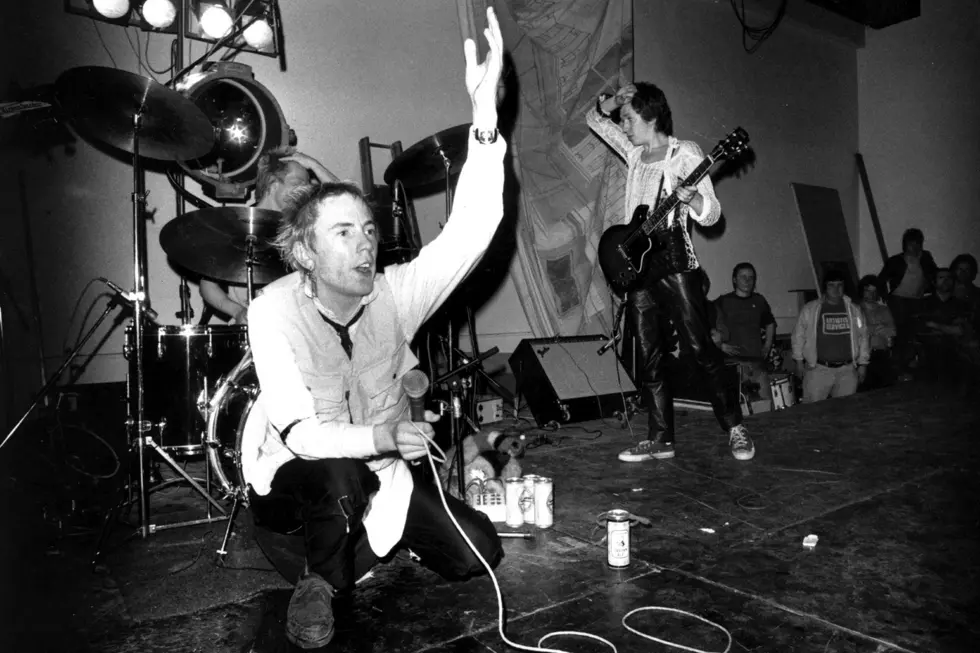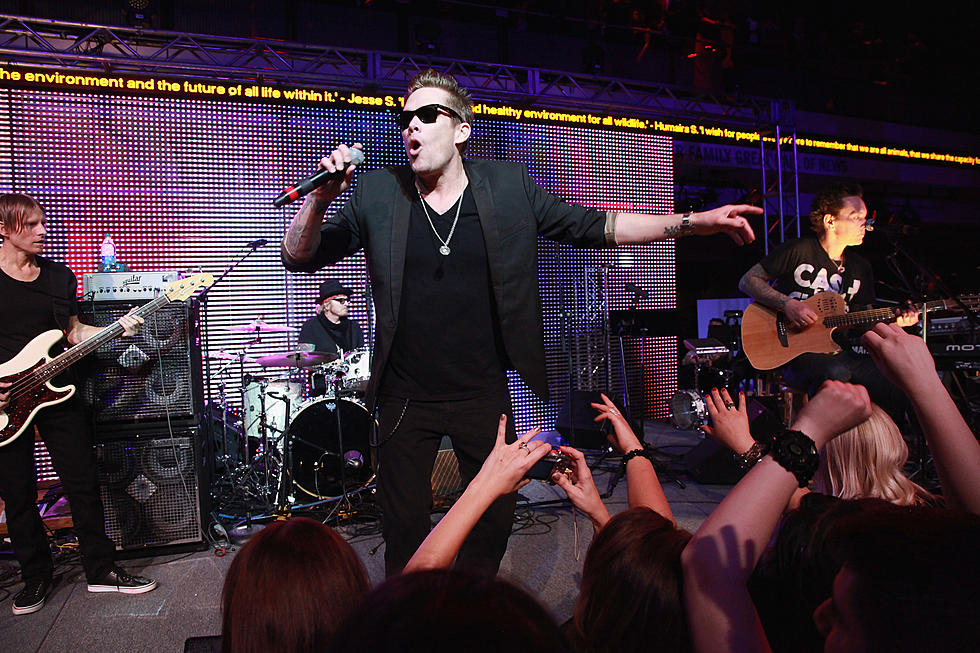
45 Years Ago: Sex Pistols Unleash ‘Anarchy in the U.K.’
In the United States and the United Kingdom – particularly in New York and London – the concept of punk had been bubbling under for some time before November 1976. Until the 26th of that month, though, the movement was a form of nostalgia, looking back to simpler times of the ‘50s rebel movies of America and the four-on-the-floor pub rock bands of Britain. The songs up until Nov. 26 had been about teenage angst rather than societal anger. When the Sex Pistols’ debut single “Anarchy in the U.K.” arrived, it represented a fully-fledged cultural revolution.
The band had been put together by impresario Malcolm McLaren, whose ambition in part was to promote the fashion and lifestyle shop, Sex, he ran with his girlfriend Vivienne Westwood. The aim was to shock and awe; and as frontman Johnny Rotten (John Lydon) spat out the opening words “Right now,” the aim was achieved. Within days the establishment were railing against the shocking working-class uprising represented by the song; within weeks the Pistols had become icons of the British class war; within months hundreds of copycat groups had begun expressing extreme emotions in their own ways; and as the years passed the impact of “Anarchy” became clearer and its value increased.
What’s often overlooked is the 3-minute 31-second song itself. It had a difficult gestation as Rotten, Steve Jones, Glen Matlock and Paul Cook – Jones was 21 at the time, the others were 20 – struggled to crystallize their intent. The song began to take shape in the summer of 1976, as bassist Matlock told Rolling Stone in 2018. “I had half an idea for a big overture, and I just started playing that descending chord progression and everybody picked up on it and said, ‘Where’s it go next?’ And I sort of geared it as we went along. John, it happened, had a bag of lyrics – just sheets of paper in a plastic bag – and he pulled something out and he said, ‘I’ve been waiting for you to come up with something because I’ve got this idea.’”
Rotten said his lyrics had been inspired by the Pistols’ own “despondencies and discrepancies” as they attempted to secure success. “I felt under serious pressure – and so did others, I think – and was trying to coin phrases and write words that would unite us as a band, as we were so bitterly opposed to each other,” the singer recalled in 2016. “’Anarchy In The U.K.’ was the end result. The ideas in that song had been rattling around in my head for years, but I had never had an outlet. Then there I was all of a sudden, a singer in a band.”
He continued: “The people running the country at that time were running it into the ground… Young people were constantly being told that they had no future. They certainly had no money. I had to bunk on the subway just to get to rehearsals. There would be trash everywhere, it felt like the downfall of Western civilization – we’re talking race riots, the National Front. It was a society facing imminent collapse, so I threw ‘anarchy’ into that mix, even though there weren’t that many anarchists running around at the time.”
The Sex Pistols - ‘Anarchy in the U.K.’
The recording was “quite a lengthy process actually,” Matlock told Songfacts in 2018. “Initially, we went in with a guy who was our live sound engineer, Dave Goodman, who was kind of good enough. He had never really produced anybody properly, so he didn't have enough clout or wherewithal to tell Malcolm McLaren not to be in the studio. And Malcolm was like the devil at his ear, going, ‘It’s not exciting enough – it's got to be faster.’ And it was getting faster and faster, and losing all its groove. In the end, we effectively went on strike, and said, ‘No, it's fine,’ and we got a different guy in, Chris Thomas, who has done some fantastic work over the years. We set up, started playing, and he said, ‘I think we've got it now.’”
Matlock – who reported that he’d been trying to channel Motown session bassist James Jamerson on the track – recalled that they’d had to wait for Rotten to arrive and record the vocal. “He didn't rush down because he was like, ‘You're useless, you can't play. You’ve been in there for weeks.’ And we said, ‘No. We've done it.’ We were right all along – we just needed the right person to realize it. And then Steve loaded up the guitars over the next few days.”
In 2017 Rotten told Rolling Stone how challenging it had been to perfect the opening words. “It took me time,” he said. “They would be telling me to count the beats, and I didn’t know what the fuck they meant – what are beats? Paul would always be very helpful with me, but at the same time it was infuriating because I wouldn’t know the terminology.”
The song would also change in the studio. “On the original demo, at the start of the song, I sang ‘Words of wisdom’ before ‘right now’ … I removed it because there is no point of overdoing it," Rotten explained. "I always thought if I over-aggrandized it, it wouldn’t mean much. When we were rehearsing we always tried to remove what was superfluous; we took out all the extra guitar flurries – Steve willingly did that most sensibly – and Paul would cut a song down to its simple roots.”
Matlock, whose tenure in the band didn’t last much longer, rejected the suggestion that he’d “hated” the song’s lyrics. “The only line that always made me wince was, ‘I am an antichrist/I am an anarchist’ – they don’t rhyme, and it always gets me,” he admitted. “Songs that don’t rhyme properly gets me somehow. It had nothing to do with the sentiment. But if you then want to go onto a whole sociopolitical argument about whether it is a good thing to have real anarchy in the U.K. and whether that’s ever going to happen is another matter. But I was quite proud to be onstage singing that song.”
With its thrusting but relentlessly steady rhythm – locked down by Cook, a drummer so controlled that he’s never broken a cymbal – Jones and Matlock gave “Anarchy in the U.K.” the perfect texture for Rotten’s vocal style as he delivered a staccato series of rallying cries for a disenfranchised generation. It only reached No. 38 in the British singles chart, amid reports of it being banned by radio stations, embargoed by pressing plant staff and the suggestion of fixing the figures to keep it from appearing further up the listings. Nevertheless, as a cultural statement and a piece of experimental pop art, it remains one of the most important singles of all time. Notable covers have included Megadeth’s 1988 version and Motley Crue’s 1991 take.
Megadeth - 'Anarchy in the U.K.'
McLaren once said of the song: “It’s a call to arms to the kids who believe that rock and roll was taken away from them. It’s a statement of self rule, of ultimate independence.” He also noted: “Punk became the most important cultural phenomenon of the late 20th century. Its authenticity stands out against the karaoke ersatz culture of today, where everything and everyone is for sale.”
Despite his iconic sloganeering, Rotten later argued: “I have always thought that anarchy is mind games for the middle class. It’s a luxury. It can only be afforded in a democratic society, therefore kind of slightly fucking redundant. It also offers no answers… I hope in my songwriting I’m offering some kind of answer to a thing, rather than spitefully wanting to wreck everything for no reason at all, other than it doesn’t suit you. I’ve always got to bear in mind I’m part of a community called the human race and an even tighter community called culture. Why would we want to destroy these things willy-nilly?”
Motley Crue - 'Anarchy in the U.K.'



